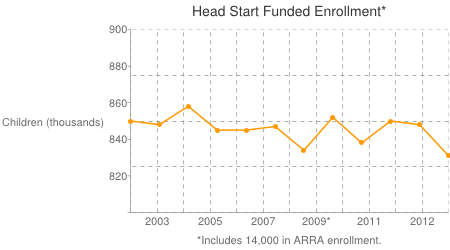
A student in Washington state's Head Start program practices her writing. Courtesy of Washington Head Start.
To get a sense of just how foolish and shortsighted the $85 billion across-the-board sequester cuts are you don’t have to look any further than Head Start. The federal government’s only pre-K program, Head Start provides comprehensive, high-quality early education and support services to children and their families living in poverty.
“The results speak for themselves,” said Joel Ryan, executive director of the Washington State Association of Head Start & ECEAP (WSA). “The research shows that kids who go through Head Start are more likely to be ready for kindergarten, less likely to need special education services and more likely to graduate from high school.”
All of that adds up to saving money over the long haul. But even before the sequester Head Start was reaching less than half of eligible children in the United States — and only 38 percent in Washington. Now, even fewer children will benefit from the program.

Figures are for Head Start and do not include Early Head Start enrollment. Source: U.S. Department of Health & Human Services Congressional Justifications, Fiscal Years 2002-2014
Estimates put the number of slots lost this year alone at 70,000. According to a recent survey by WSA, 68 percent of Washington state’s Head Start providers will be forced to drop children from their classrooms over the next few months as a direct result of sequestration.
“These cuts are happening now,” said Ryan. “A lot of directors have issued layoff notices to teaching staff and kids are already getting dropped from programs. That’s going to get worse come September. Most of the impact right now is that they are closing programs earlier in the day, or closing earlier in the school year altogether, so families are needing to scramble to find some other place for child care.”
One place that has sliced a half-hour from its four-hour Head Start program is Snohomish County, where Robert Wheeler’s 4-year-old daughter started attending class last October.
“When she started she could only identify the letters ‘i’ and ‘s’ but she couldn’t spell the word ‘is,’” said Wheeler. “Just over seven months later she’s reading at the kindergarten/first-grade cusp — reading books and sight words to me. Her whole vocabulary has changed.”
Wheeler emphasized that it’s not just about the classroom and “learning your ABCs.”
“It’s about understanding the whole emotional, mental and cognitive support needed — and helping families understand it too — because the parents are with the kids more than the teachers are,” he said.
Wheeler said that while he has family members he can lean on to provide child care, he’s seeing how the shortened Head Start day is affecting the wellbeing of other parents and children.
“There are parents that work part-time who have had to cut their hours back,” he said. “And some full-time workers who were eligible for child care programs before and after school, and they’ve had to cut back to part-time. Some have even lost jobs and it’s just a downward spiral.”
Ryan also noted that you can’t isolate Head Start cuts from cuts in other programs — it all adds up to making life far more difficult for low-income families.
“It’s WIC programs, or fuel programs, or they are trying to go to school and their work-study is cut — the families we serve are being affected in a host of ways,” said Ryan.
But the biggest hit for Wheeler and his daughter might come in September when their Head Start program is closed for good. He said it’s a real loss for the entire community — the facility was built exclusively for Head Start in the 1970s.
“What lawmakers don’t understand is that it’s the way families and communities are working together as partners in Head Start that creates an even greater potential for children to succeed,” said Wheeler.
The closure of the center will directly affect 38 children, two teachers, three or four paid employees, and three salaried positions. Wheeler said he hopes three state-run early childhood education programs — called ECEAPs — will be able to absorb some of the children currently participating in Head Start.
“But there’s no guarantee,” said Wheeler. “ECEAP won’t take a Head Start kid if another kid has greater need.”
Ryan said that next school year not only will there be fewer Head Start classrooms and fewer students served, but most of the programs that survive the cuts will be opening later in the year, as late as October.
“That’s really putting these kids at a further disadvantage — they are already starting behind, Head Start’s job is to get those kids ready for kindergarten. They are going to be doing it in fewer hours, and with less staff to help them get ready,” said Ryan.
He adds that this is all happening as more kids are living in poverty, more are homeless and there is increased “adverse trauma and toxic stress” in struggling families.
“We see it in the rising number of child protective services cases,” said Ryan. “And as there is increased need for assistance, the federal government is cutting back and pulling services. It’s really a double hit to the gut of these kids and families.”
But Wheeler remains hopeful that media attention can make a difference in mobilizing citizens to demand a more sensible approach to the budget.
“If we reach out more to the public, I think we can make greater waves in the political realm,” he said.
Take Action
Today is the National Early Learning Day of Action. If you are interested in learning more about the benefits of early education programs and want to show your support, visit the National Head Start Association action page.
You can also participate in a tweet-chat starting at 2 PM ET, featuring Sec. Arne Duncan and Sec. Kathleen Sebelius discussing the importance of #PreK4All. Follow the Children's Defense Fund at @ChildDefender.
 |
Greg Kaufmann is a freelance writer and Nation contributor covering poverty in America, primarily through his blog, This Week in Poverty. His work has also been featured on MSNBC’s Melissa Harris-Perry show, CBSNews.com, NPR.org, WashingtonPost.com, Common Dreams and Alternet. He serves as an adviser for the Economic Hardship Reporting Project. |

